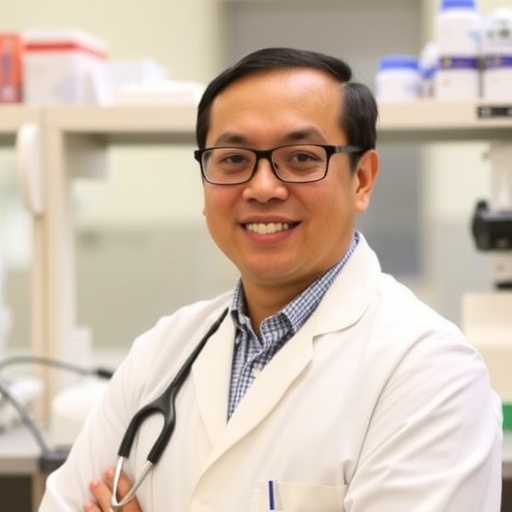The University of Cincinnati’s College of Allied Health Sciences marks a significant achievement with the awarding of its inaugural National Institutes of Health (NIH) K grant, recognizing emerging leaders in biomedical and behavioral research. Dr. Andrea Ford, PhD, a speech-language pathologist and assistant professor within the Department of Communication Sciences and Disorders, has secured a prestigious four-year K23 award totaling $765,000 from the National Institute on Deafness and Other Communication Disorders. This grant will support Dr. Ford’s pioneering research aimed at advancing intervention strategies for the communication challenges faced by preschool children with autism spectrum disorder (ASD).
Dr. Ford’s project centers on adapting the Extensions of Community Health Outcomes (ECHO) model, an innovative, technology-enabled framework originally designed for healthcare knowledge dissemination. The ECHO model leverages case-based problem-solving and ongoing mentoring to scale best practices across geographically dispersed communities. Its application to early childhood communication development represents a novel interdisciplinary approach with transformative potential for educating professionals and caregivers who support young children with ASD.
A critical impetus guiding Dr. Ford’s research is the prevalence of language delays in approximately 75% of preschoolers diagnosed with autism. By engaging directly with educators and caregivers, her work seeks to enhance access to evidence-based communication interventions during this crucial developmental period. This approach targets narrowing the communication gap experienced by children with ASD and aims to foster meaningful interactions that are fundamental to cognitive and social development.
Integral to the success of this research is a collaborative mentorship network, including Dr. Jareen Meinzen-Derr, PhD, a professor in the University of Cincinnati’s College of Medicine and a respected investigator at Cincinnati Children’s Hospital Medical Center. Dr. Meinzen-Derr emphasizes the profound importance of communication as a basic human connection, often undervalued until it is disrupted. She lauds Dr. Ford’s efforts to equip educators with scalable, pragmatic tools that empower both teachers and students to overcome communication barriers.
The NIH K award mechanism itself is designed to cultivate the next generation of clinical researchers, providing recipients with comprehensive career development resources, including advanced coursework, workshops, and mentorship opportunities. Within this framework, Dr. Ford will pursue a graduate certificate in community-engaged research for health. This interdisciplinary program, jointly offered by UC’s College of Medicine and College of Arts and Sciences through the Center for Clinical and Translational Science and Training (CCTST), underscores the incorporation of community partnership principles into research methodologies.
Dr. Ford’s project unfolds in a phased approach. During the initial two years, her team will conduct an extensive group-level assessment alongside mixed-methods research engaging local educators and caregivers. These formative investigations aim to tailor the ECHO model to the specific professional development needs related to supporting the language and communication growth of preschoolers with autism. This approach epitomizes participatory research, fostering a collaborative and iterative model development process.
To garner meaningful insights, Dr. Ford invites participation from educators across the Tristate area, including Cincinnati Public Schools. The goal is to create three focus group cohorts of twenty-five participants each, facilitating interactive sessions that prioritize the voices and experiences of those directly involved in early childhood education. This engagement promises to yield actionable data on desired support structures and effective delivery mechanisms for professional development.
Pioneering inclusivity, the project enshrines the principle of “nothing about us without us” by integrating perspectives from adults with autism. This commitment ensures that the intervention framework authentically reflects the lived realities of the autistic community, promoting interventions that are both relevant and respectful. Such integrative practices set a precedent for inclusive research design, enhancing validity and community acceptance.
The latter half of the grant period will focus on synthesizing community feedback and piloting a cost-free virtual learning community in collaboration with the established ECHO Autism network. Participants—up to 40 preschool educators—will engage in dynamic sessions transcending conventional workshops. These immersive interactions will coalesce around developing specialized intervention strategies, such as constructing and demonstrating augmentative and alternative communication (AAC) systems utilizing technologies like iPads or picture-based symbol sets.
Dr. Ford envisions this initiative as a scalable and sustainable model that bridges science and practice. By fostering a virtual community of practice founded on mutual learning and mentorship, her research promises to significantly uplift educator competence and confidence, ultimately translating into improved communication outcomes for children at a developmental crossroads.
In concurrence with Dr. Meinzen-Derr, this work directly addresses a critical void in professional development pathways for educators tasked with supporting preschoolers on the autism spectrum. The strategic alliance with key stakeholders and use of cutting-edge frameworks enhances the probability of widespread adoption and enduring impact of the tailored communication interventions.
This milestone for the University of Cincinnati embodies the institution’s commitment to community-engaged, translational research that not only advances scientific understanding but also delivers tangible benefits to vulnerable populations. Prospective collaborators and preschool educators interested in contributing to this transformative effort are encouraged to connect with Dr. Ford via her university email.
The project exemplifies how cross-disciplinary innovation, inclusive practices, and technology-enabled mentorship can converge to address profound challenges in early childhood development. As Dr. Ford’s work progresses, it may pave the way for similar initiatives targeting diverse developmental disabilities, amplifying the reach and efficacy of communication interventions within education systems internationally.
Subject of Research: Communication development support for preschoolers with autism through technology-driven educational interventions.
Article Title: Bridging the Communication Divide: University of Cincinnati’s Innovative ECHO Model Adaptation for Autism in Early Childhood.
News Publication Date: Not specified.
Web References:
– https://echoautism.org/
– https://www.cctst.org/graduate-certificate-cenr
Keywords: Communication disorders, developmental disabilities, early education, autism spectrum disorder, augmentative and alternative communication, community engagement, professional development, technology-enabled mentorship, early childhood intervention, NIH K grant, translational research, participatory research.




